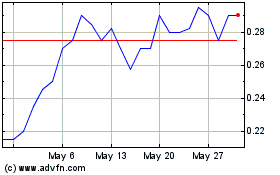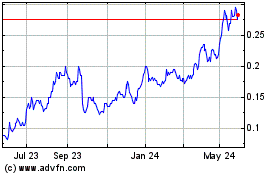Clinical stage synthetic cannabinoid company Botanix
Pharmaceuticals Limited has today published positive data from a
world first human clinical study, examining the safety,
tolerability and efficacy of its BTX 1801 antimicrobial product for
the eradication of Staphylococcus Aureus (Staph).
This press release features multimedia. View
the full release here:
https://www.businesswire.com/news/home/20210202006185/en/
Staph, also called golden staph, is a common bacterium that
lives on the skin or in the nose. In most situations it is
harmless; however, if it enters the body through a cut in the skin,
it can cause a range of mild to severe infections, or even death.
As part of this study, Botanix was working to minimise the risk of
infection by removing or decolonising bacteria from the nose – a
primary site for spreading infection to other parts of the body
(the nose is frequently touched, usually more than 40 times a
day).
The BTX 1801 Phase 2a nasal decolonisation proof of concept
study showed that two different BTX 1801 synthetic CBD formulations
(ointment and gel) were safe, well tolerated and successful at
eradicating Staph bacteria from the nose of healthy volunteers
nasally colonised1 with Staph.
Eradication rates as high as 76.2% were obtained at Day 7 post
treatment, with eradication effects extending through to Day 28 of
the study to 23.8%, despite no further treatment after Day 5.
Botanix met the endpoints of its BTX 1801 Phase 2a
study.
“We are very pleased to announce this top-line data that
demonstrates synthetic cannabidiol (“CBD”) is a safe and effective
nasal decolonisation agent. Moreover, this is the first time that
synthetic CBD has been shown to have clinical utility as an
antimicrobial agent in humans,” said Botanix
President and Executive Chairman, Vince Ippolito.
“These results support continued development of BTX 1801 for the
treatment of a variety of infections, in addition to the prevention
of post-surgical infections.”
Antibiotic resistance is a significant global challenge in the
context of public health, with the UN forecasting drug resistant
diseases could cause 10 million deaths each year by 2050 and result
in an annual economic loss of US$100 trillion if new solutions are
not found.2
Staph and methicillin-resistant Staph (MRSA) are the leading
cause of Surgical Site Infections3 (SSIs) and approximately 80% of
SSIs are caused by the patient infecting themselves from their own
nose. Antibiotics used for nasal decolonisation (e.g. BactrobanTM
also known as mupirocin) have seen a significant increase in the
development of resistance, with some hospitals recording resistance
rates as high as 95% restricting its use.2
“BTX 1801’s observed upfront eradication rates and sustained
eradication effect, following the treatment period, is very
encouraging. Data from the BTX 1801 study represents a significant
milestone and enhances the potential of better infection prevention
measures in surgical settings to combat the growing global
development of antibiotic resistance,” said Murdoch University’s Chair of Public Health, Professor
Geoffrey Coombs.
Botanix is now actively exploring opportunities for its
synthetic cannabidiol and broader cannabinoid analog assets in
other secondary infections, and across different of routes of
administration.
Summary of 1801 Study design and endpoints
The 1801 Study was a randomised, vehicle-controlled,
double-blind, Phase 2a study conducted at a single site due to
constraints associated with COVID-19. The primary objectives
focused on evaluating safety and tolerability, as well as
evaluating the effectiveness of two different candidate
formulations of BTX 1801 (ointment or gel containing synthetic
cannabidiol), compared to their respective vehicle or placebo
formulations (the ointment or gel without synthetic cannabidiol).
Each formulation was applied twice daily for 5 consecutive days to
the anterior nares (the inner surface of the nose) of healthy
participants intranasally colonised with Staph. Male and female
healthy volunteers aged 18-65 were eligible to enrol in the 1801
Study.
Safety and tolerability were evaluated at prespecified
timepoints during treatment (Days 1 to 5) and following treatment
at Day 7 (2 days after the end of treatment), Day 12 (7 days
following the end of treatment) and at Day 28 (23 days after the
end of treatment). Efficacy was evaluated at Day 7, Day 12 and Day
28. No prospective calculations of statistical power were made for
this exploratory study.
Summary of 1801 Study results
Results of the BTX 1801 Study show the two formulations of BTX
1801 met the Study endpoints. Firstly, BTX 1801 was safe and well
tolerated, with all 66 enrolled participants successfully
completing the 1801 Study with each group (ointment, gel and
vehicle) consisting of 22 participants. The incidence of adverse
events was low, mild in severity and occurred at similar rates
across the different treatment groups with no severe events
reported. Secondly, efficacy of both ointment and gel formulations
at the primary endpoint of Day 12 was demonstrated.
At Day 7, one of the secondary endpoints (2 days after the end
of the treatment period), Staph eradication was demonstrated in
76.2% and 68.8% of the participants in the BTX 1801 ointment and
gel groups respectively, compared with 27.8% of participants in the
combined vehicle groups. At Day 12 (7 days after the end of the
treatment period), the primary endpoint, BTX 1801 demonstrated
Staph eradication in 38.1% of participants in the ointment group
and 25.0% in the gel group, compared to 16.7% for the combined
vehicle groups.
Despite no treatment since Day 5 of the study, by Day 28, the
other secondary endpoint, (23 days after the end of the treatment
period), Staph eradication rates of both formulations of BTX 1801
only declined slightly from Day 12, to 23.8% and 18.8% for the BTX
1801 ointment and gel groups respectively, compared with 12.5% for
participants in the combined vehicle groups.
_______________________ 1 Nasal colonisation or carriage of S.
aureus was confirmed on 3 separate occasions over a period of up to
43 days prior to the subject receiving treatment. 2 No Time to
Wait: Securing the future from drug-resistant infections. Report to
the Secretary-General of the United Nations (2019) available at
https://www.who.int/antimicrobial-resistance/interagency-coordination-group/IACG_final_report_EN.pdf?ua=1
3 Decolonization to Reduce Post discharge Infection Risk among MRSA
Carriers, Huan et al Feb 14 2019, N Engl J Med 2019;
380:638-650
View source
version on businesswire.com: https://www.businesswire.com/news/home/20210202006185/en/
Media enquiries Haley Chartres H^CK Director P: +61 423
139 163 haley@hck.digital
Media resources Video HERE (YouTube) HERE (Dropbox)
Botanix Pharmaceuticals (ASX:BOT)
Historical Stock Chart
From Jan 2025 to Feb 2025

Botanix Pharmaceuticals (ASX:BOT)
Historical Stock Chart
From Feb 2024 to Feb 2025
